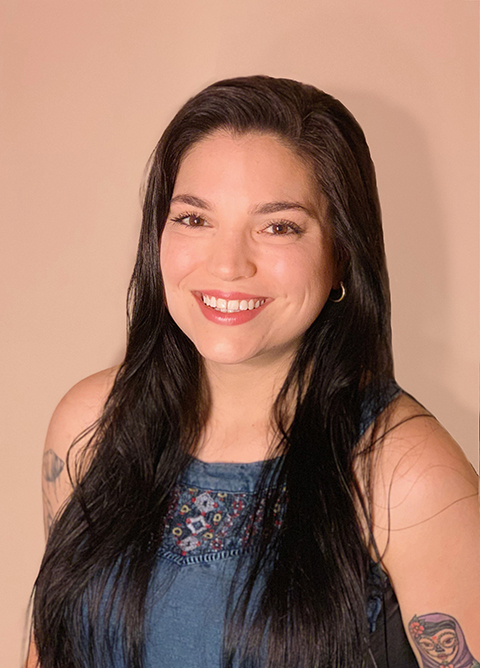Fighting the stigma of addiction with science
Kasey Girven’s mother wanted her daughter to be a physician, but when Girven was introduced to neuroscience and addiction research, she saw that she could help her community as a research scientist.
Girven’s mother grew up in Mexico and would often come to the U.S. when she was a teenager as a seasonal migrant worker in the agricultural industry. She married a member of the U.S. military and was able to gain citizenship through a military program. Girven was born when the family was stationed in Germany. They eventually settled in McAllen, Texas.

Because Girven was a first-generation college student, her mother hoped she would enter a science, technology, engineering or mathematics field for career stability. As it happened, Girven had a strong interest in the sciences, and her mother encouraged her to become a physician. She attended the University of Texas at San Antonio on a premedical track majoring in biology.
During her senior year, a course on brain and behavior ignited Girven’s curiosity, and she changed her career path to academic research.
“It was a small seminar course where we were looking at human case studies that had brain damage, and we had to do some sort of pathology to try and understand what the disease was,” Girven said. “It was really interesting to me, and I really got excited to learn more about the brain.”
Girven earned an M.S. in biology at UTSA with an emphasis on neuroscience. She found a mentor in Matthew Wanat, an associate professor of neuroscience and developmental and regenerative biology at UTSA. She completed her master's thesis in his lab and credits him with preparing her for graduate school by providing her first major experience in brain research. He also introduced her to addiction studies.
Girven earned a Ph.D. in neuroscience from the University of Maryland under the guidance of Dennis Sparta. In his lab, she studied the insula, a part of the brain involved in consciousness and fear processing, and its connection to the bed nucleus of the stria terminalis, which is implicated in stress and anxiety. The insula plays an important role in emotional regulation and decision-making and may contribute to our conscious desire to take addictive substances.
Now a fourth-year postdoctoral fellow at the University of Washington, Girven continues to work in addiction research. Her current project examines the role of a peptide, neuropeptide S, in decision-making and reward-seeking behaviors in the orbitofrontal cortex. Specifically, she is investigating how the activity of endogenous neuropeptide S pathways change with alterations in reward value, such as sugar versus fentanyl.
For her work, the National Institutes of Health gave Girven a Pathway to Independence Award in February. She is also part of the Maximizing Opportunities for Scientific and Academic Independent Careers program, known as MOSAIC, a collaborative effort by the American Society for Biochemistry and Molecular Biology and the National Institutes of Health. The program provides mentorship, professional development and community for postdoctoral trainees from diverse backgrounds.
Girven’s background gave her a strong desire to address the stigma of addiction. Many of her friends and family members have struggled with substance abuse disorder.
“I don't know anybody who doesn't have a family member afflicted with substance use issues,” Girven said. “And it's definitely something that's been prevalent throughout my entire life. I've had very close family members struggle with it.”
She hopes her research will provide lawmakers with the information they need to craft legislation informed by science rather than judgment.
“Removing any kind of stigma from people who suffer from substance use disorder will be huge in instructing people who create laws to make informed decisions about the things they're voting on,” she said. “That’s where I think my science can really play a role.”
In 2020, Girven started the Racial Equity Book Club; every semester, a different member chooses a book or chapter to discuss. She also loved board games, a hobby that helped ease her transition from a Ph.D. to a postdoc.
“In the pandemic, I was incredibly stressed with starting a postdoc, and being in a new space and leaving so many friends behind in my Ph.D., it was really hard,” she said. “And so, I started making board game content on TikTok.”
In addition to her TikTok account, Girven streams board game plays and hosts a podcast called “The Feeding Phase.” Her TikTok account, @brain_in_a_jar, has nearly 200,000 followers.
Enjoy reading ASBMB Today?
Become a member to receive the print edition four times a year and the digital edition monthly.
Learn moreGet the latest from ASBMB Today
Enter your email address, and we’ll send you a weekly email with recent articles, interviews and more.
Latest in People
People highlights or most popular articles

Simcox wins SACNAS mentorship award
She was recognized for her sustained excellence in mentorship and was honored at SACNAS’ 2025 National Conference.

From humble beginnings to unlocking lysosomal secrets
Monther Abu–Remaileh will receive the ASBMB’s 2026 Walter A. Shaw Young Investigator Award in Lipid Research at the ASBMB Annual Meeting, March 7-10 in Washington, D.C.

Chemistry meets biology to thwart parasites
Margaret Phillips will receive the Alice and C. C. Wang Award in Molecular Parasitology at the ASBMB Annual Meeting, March 7-10 in Washington, D.C.

ASBMB announces 2026 JBC/Tabor awardees
The seven awardees are first authors of outstanding papers published in 2025 in the Journal of Biological Chemistry.

Decoding how bacteria flip host’s molecular switches
Kim Orth will receive the Earl and Thressa Stadtman Distinguished Scientists Award at the ASBMB Annual Meeting, March 7–10, just outside of Washington, D.C.

Thiam elected to EMBO
He was recognized during the EMBO Members’ Meeting in Heidelberg, Germany, in October.

